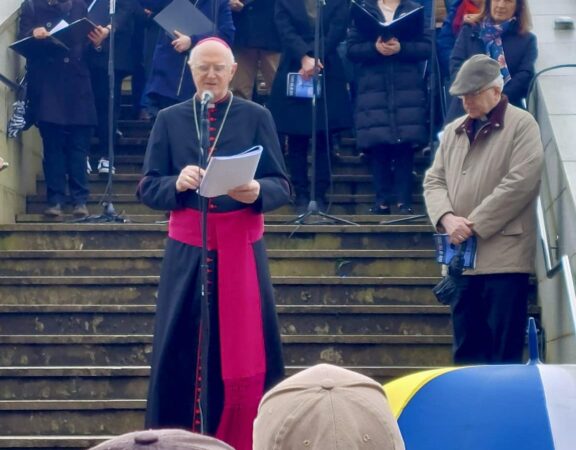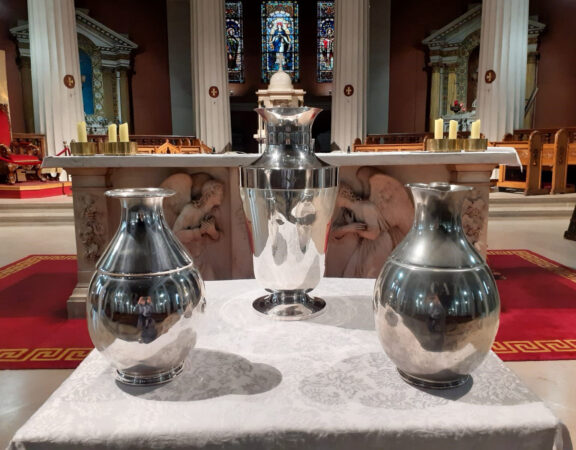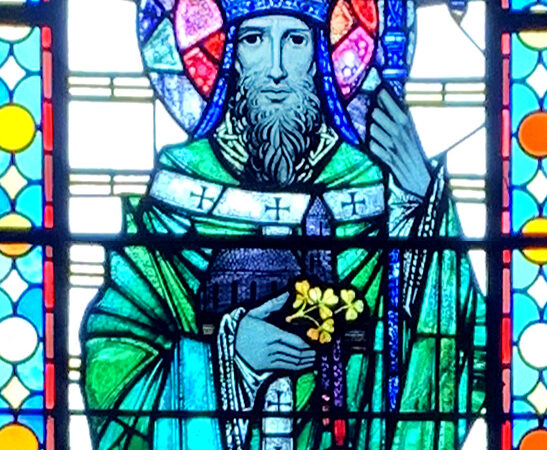
VOTIVE MASS OF THE HOLY SPIRITon the occasion of the
OPENING OF MICHAELMAS LAW TERM 2009
Homily Notes of
Most Rev. Diarmuid Martin
Archbishop of Dublin, Primate of Ireland
—————-
Saint Michan’s Church, Halston Street, 5th October 2009
We have come to invoke the Holy Spirit. How does the Spirit work? We see one example in the first reading from the Acts of the Apostles: Those who heard the first disciples came from various parts of the world yet all heard what was said in their own language.
There is clearly a reference here to the Old Testament story of the Towel of Babel. That story is about that false dream of humans of all times that they can on their own build a tower which would reach heaven; that notion that humankind on its own can enter into and take possession of what belongs only to God, and to act as if the world and all that is, is simply ours, to do with it as we wish, rather than it belonging to God and been given to us to be stewarded according to God’s norms.
The Old Testament story notes that not only is such a project a total folly and that the tower will eventually collapse, but that a further result of this folly of humankind would be to bring, along with the collapse of the project, a division of language into human history. When we humans attempt to act like God, we end up breaking down the natural ability of humans to communicate with each other and to build and create a real sense of community.
Community is not an added dimension to our being human; in human kind there is a natural need and tendency to construct and live in communion and community. We are social beings.
With the coming of the Spirit, the Acts of the Apostles remind us that all hear what was said in their own language. With the coming of the Spirit, the harmony of communication between people is restored. We pray that all our work will strengthen the fabric of society and make it more caring.
We heard then in the second reading that the Spirit helps each of us to overcome the danger of yielding to self-indulgence. Spirit and self-indulgence are opposed to each other, but they are both constantly present in each of us in such a way that we are so often unable to carry out our good intentions. The reading lists what Saint Paul identifies as the fruits in his time of self indulgence. Many of these are still relevant to the way we are tempted to act in our society. Each generation has to look at those works of self-indulgence as they occur in human behaviour or as they are somehow embedded in the culture of the times.
The gifts of the spirit are on the contrary those which endure: “love, joy, patience kindness, goodness, trustfulness and self control”. As we celebrate this Mass for the Opening of the Michaelmas law term we pray for those gifts and make our own the prayer of Saint Paul at the end of the reading: “Since the Spirit is our life, let us be directed by the spirit”.
The gifts of the Spirit are not gifts which automatically change us. The gifts of the Spirit are not imposed. The gifts of the spirit are gifts of discernment. They help us, in the reality of our own personal and social responsibility, to guide our lives. We are also challenged to discern the ways, obvious and more subtle, with which the power of self-indulgence tends to weaken the fruits of the spirit in our lives.
The spirit is a spirit of discernment, the one who “will teach you everything and remind you of all I have said to you”. The revelation of God was complete in Jesus Christ, but the Spirit is with the Church to lead each generation to understand that revelation in a new manner. The Spirit is the one who challenges each generation with the perennial newness of the message of Jesus Christ. If the message of Jesus is perennially new it should challenge each of us out of complacency into to a freshness of spirit; it should challenge us out of conformity, into a spirit of freedom and initiative.
The Christian community must be a community which allows the newness of the teaching of Jesus to cleanse it from drifting into sinfulness; to shake it up from complacency and fatigue and allow a surge of Gosple energy to renew it, as a sign of the unity of all people, a place where all understand the word of God and where true communication between people of different backgrounds really takes place.
The Christian presence in society should not be one of ideas disincarnated from the real life of its members. A just world will only be attained by people who are just; a truthful world will only be attained by people who abide by the truth, a caring world will only be attained by people who understand and live what true concern for others is all about.
The message of Jesus is above all a message of love. Love is about giving and understanding. It is not just about the giving of things or of time. It is above all about a giving of self, following on the life of Jesus who did not consider the outward signs of divinity as significant as revealing the self-giving of God.
There are many ways in which here in Ireland we have been trapped into a false understanding of God. A false understanding of a judgmental God can lead to harshness in society and indeed to an intolerance or feeling of superiority or judgment of others.
An awareness of the perennial newness of the message of a God of love can be a vital contribution of the believer to the society to which he or she belongs. We see that on-going prosperity on its own cannot bring the harmony which society requires. Self-indulgence can lead to corruption, it can lead to a total disregard for the rights of others, it can lead to the breakdown of community, and it can lead to violence.
Violence is a continual threat to the harmony of society in today’s Ireland. The violent believe that they can impose their own law of self-interest on others. In this sense violence is profoundly anti-democratic. Violence attempts to limit the effectiveness of community through a climate of fear.
At the beginning of this Law Term, I encourage all those who are at work in our society in the building and support of community. I think of our schools which have traditionally been a focal point of community-building in society and are in the forefront in the changing demography of our society. I think of those who are involved in sporting and voluntary and community organizations. I think of bodies like the Society of Saint Vincent de Paul or of Crosscare in this diocese who are attentive to the needs of the new poor and those who live in new precariousness. I think of the work of An Garda Siocanha not only in protecting our communities but also in their support of those courageous community enterprises which fight criminality.
I think of the cry of those who weep at the high cost to life of drug abuse, at the suffering of criminal exploitation and abuse, at the carnage due to recklessness on our roads.
I think of those whose mission it is to advance legislation which promotes harmony and equality and those whose mission it is to apply such laws and administer justice. Yours is a task of the Spirit: to ensure that true communication in the fullest sense between people is not inhibited by the raw power of the self-interest of the few.
The spirit renews. Ireland needs renewal today just as at any period in our history. The Church needs renewal, day after day, to ensure that the message it is called to proclaim is not clouded by a false sense of its identity and role in society. Each of us is called to renewal. Today more than at many other times we need men and women of the Spirit, of courageous and generous commitment to the values that endure. “Since the Spirit is our life, let us be directed by the spirit”.









